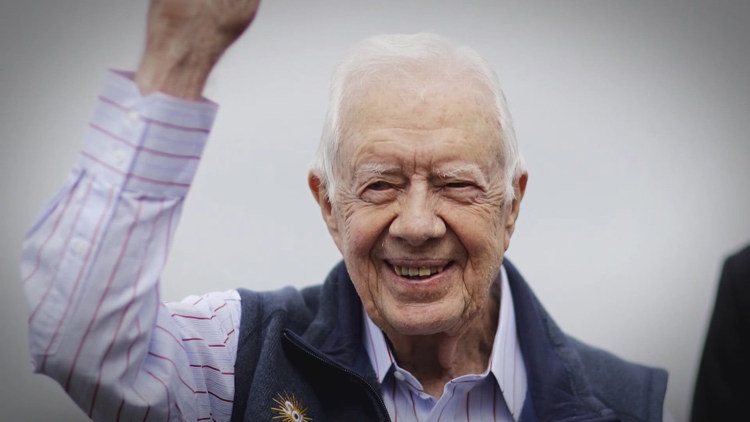

Experts say Carter won’t be remembered for passing any groundbreaking legislation, but rather for the opportunities he created for African Americans.
WASHINGTON — A segregated society. That was the reality of Jimmy Carter’s boyhood. He wrote about his younger years in his book of poetry, ‘Always A Reckoning.’
“My young life, shaped by those I loved,” Carter wrote in his prose.
Despite that segregated society, African Americans played a large part in his childhood and who he would grow up to be.
“Jimmy Carter had grown up with African American playmates. His mother was a nurse who delivered African American babies,” said Barbara Perry, Director of Presidential Studies at UVA’s Miller Center.
“Her brown skin fixed her in our segregated world, Yet Rachel had an aura of a queen,” wrote Carter.
Rachel Clark is the woman Carter vividly writes about in his poetry. She lived and worked on his parent’s peanut farm. It was Rachel, a Black woman who shaped the person the 39th president became.
According to the University of Virginia’s Miller Center, when it comes to civil rights, Carter’s legacy is layered. He is not known for passing groundbreaking legislation, but rather the more symbolic way he pushed civil rights forward. Historians say that legacy began with his inaugural speech as governor of Georgia, calling for an end to segregation.
“He really carries that through and makes good on that promise as governor of Georgia, bringing Blacks, particularly, into high positions of government,” said Perry.
As president, Carter took similar actions.
“He developed this affirmative action program to get more minorities, people of color and women on the federal judiciary, and he was successful at that,” said Perry.
He also exposed the world to a more diverse United States, appointing African Americans to prominent positions in his administration. Andrew Young as U.N. Ambassador, Patricia Roberts-Harris as the Secretary of Housing and Urban Development and the Secretary of Health, Education and Welfare.
Before being elected to office, some might say Carter was silent on important civil rights issues. But historians say in order to be a viable candidate in the south, he had to tread lightly.
“Not all was a bed of roses when it came to Jimmy Carter and Civil Rights. For example, coming up to his run for presidency, Jimmy Carter actually opposed busing for school integration purposes. I think he genuinely thought it was not the best policy, but he knew it would appeal to white voters,” said Perry.
Those who studied his life, say Carter often times by his actions, more than his words, can be put into the category of a civil rights champion.
Once he left the oval office, he did not stop championing those causes. He and his wife, Rosalynn, partnered with Habitat for Humanity to hammer the cause of affordable housing. Together, they traveled the country and the world to blitz-build single family homes.
“Particularly people of color have not been given opportunities to build their own wealth, and one of the ways that Americans do that and have done it is through home ownership,” said Perry.
In July 1992, Carter came to Washington, DC to help volunteers and 10 families saw, hammer and raise their own houses on Benning Road, Southeast.
“You know, we spend a lot on weapons. We cut back on housing. We spend a lot on weapons. We cut back on healthcare. I think this is a , it’s not a charity when you give a person good health and a decent place to live. It’s a sound investment for our country,” Carter told WUSA9 back in 1992.
It’s an investment Jimmy Carter continued to make, in service to his country, in more ways than one, to move civil rights for all, forward.


